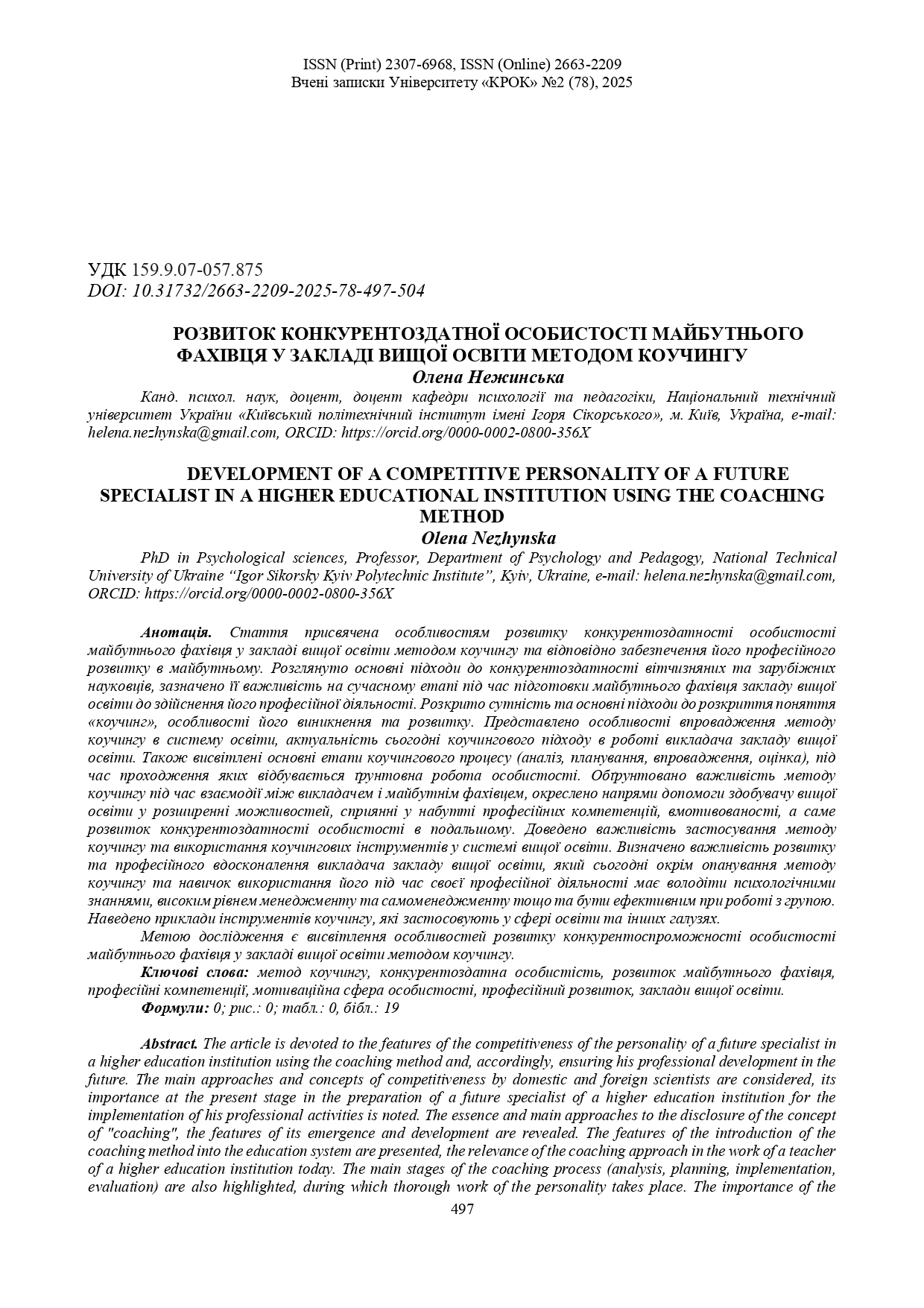DEVELOPMENT OF A COMPETITIVE PERSONALITY OF A FUTURE SPECIALIST IN A HIGHER EDUCATIONAL INSTITUTION USING THE COACHING METHOD
DOI:
https://doi.org/10.31732/2663-2209-2025-78-497-504Keywords:
coaching method, competitive personality, development of a future specialist, professional competencies, motivational sphere of personality, professional development, higher education institutionsAbstract
The article is devoted to the features of the competitiveness of the personality of a future specialist in a higher education institution using the coaching method and, accordingly, ensuring his professional development in the future. The main approaches and concepts of competitiveness by domestic and foreign scientists are considered, its importance at the present stage in the preparation of a future specialist of a higher education institution for the implementation of his professional activities is noted. The essence and main approaches to the disclosure of the concept of "coaching", the features of its emergence and development are revealed. The features of the introduction of the coaching method into the education system are presented, the relevance of the coaching approach in the work of a teacher of a higher education institution today. The main stages of the coaching process (analysis, planning, implementation, evaluation) are also highlighted, during which thorough work of the personality takes place. The importance of the coaching method during the interaction between the teacher and the future specialist is substantiated, the directions of assistance to the higher education applicant in expanding opportunities, promoting the acquisition of professional competencies, motivation, namely the development of the competitiveness of the individual in the future are outlined. The importance of applying the coaching method and using coaching tools in the higher education system is proven. The importance of the development and professional improvement of a higher education institution teacher is determined, who today, in addition to mastering the coaching method and the skills of using it during his professional activities, must have psychological knowledge, a high level of management and self-management, etc. and be effective when working with a group. Examples of coaching tools used in education and other industries are given.
The purpose of the study is to highlight the features of the development of the competitiveness of the personality of a future specialist in a higher education institution using the coaching method.
Downloads
References
Крупник, І. Р. (2024). Коучинг в освіті: теорія і практика. Науковий вісник Херсонського державного університету. Серія «Психологiчнi науки». Секція 2. Педагогічна та вікова психологія, 2, 22-27. URL: https://pj.journal.kspu.edu/index.php/pj/article/view/1319/1266
Лев, Н. Ю., & Бала, Р. Д. (2012). Моделі коучингу: характеристика та особливості застосування. Вісник Національного університету «Львівська політехніка» : зб. наук. пр., 727, 76-81.
Нежинська, О. О. (2024). Силабус навчальної дисципліни «Основи коучингу». Ірпінь : Державний податковий університет, 8. URL: https://drive.google.com/file/d/1L5uAMq0wufZe4STlzNxTbMNSW_coQHiK/view
Нежинська, О. О., & Тименко, В. М. (2015). Використання коучингу в системі вищої освіти України. Вісник післядипломної освіти, 15, 236-245. URL: http://umo.edu.ua/visnik-pisljadiplomnoji-osviti---poperedni-vidannja-arkhiv/visnik-pisljadiplomnoji-osviti-zbirnik-naukovikh-pracj-vipusk-15-28
Нежинська, О. О., & Тименко, В. М. (2017). Основи коучингу : навч. посібн. Київ ; Харків : ТОВ «ДІСА ПЛЮС», 220. : іл. URL: https://lib.iitta.gov.ua/id/eprint/710073/1/Основи%20коучингу_розміщення%20в%20ел.біблітоеку.pdf
Остафійчук, Р. Ю. (2021). Конкурентоспроможність як організаційний і особистісний феномен у дискурсі соціальної психології. Наукові студії із соціальної та політичної психології, 46(49), 251-257. URL: https://doi.org/10.33120/ssj.vi46(49).174
Сергеєва, Л. М., & Стойчик, Т. I. (2020). Конкурентоздатність як умова професійного становлення фахівців : монограф. Дніпро : Журфонд, 181.
Сидоренко, В. В. (2021). Діяльність школи педагогічного коучингу в умовах управління децентралізацією освіти в Україні. Вісник післядипломної освіти. Серія: Педагогічні науки, 16. 173-193. URL: https://ojs.uem.edu.ua/index.php/vpo/article/view/203
Сингаївська, І. В., & Іванова, О. В. (2023). Коучинговий підхід як інструмент для встановлення довірливих стосунків між батьками і підлітками. Вчені записки Університету «КРОК», 2(70), 166-172.
Bönte, W., Lombardo, S., & Urbig, D. (2017). Economics meets psychology: Experimental and self-reported measures of individual competitiveness. Personality and Individual Differences, 116, 179-185. URL: https://doi.org/10.1016/j.paid.2017.04.036
Gallwey, W. Timothy (1974). The Inner Game of Tennis. 1st. New York : Random House, 141.
Downey, M. (2015) Effective Modern Coaching: The Principles and Art of Successful Business Coaching. London : LID Publishing, 224.
Marciniak, Ł. T., & Rogala-Marciniak, S. (2012). Coaching. Zbiór narzędzi wspierania rozwoju. Warszawa : ABC a Wolters Kluwer business, 392.
Maslow, A. H. (1970). Motivation and personality. Second edit. New York, Evanston and London : Harper & Row, Publishers, Inc., 394.
Nieżyńska, H., & Tymenko, W. (2016). Coaching jak innowacyjna technologia pedagogicznego współdziałania w systemie wyższej edukacji Ukrainy. Pracy IV Międzynarodowej Multidyscyplinarnej Konferencji Naukowej «Dylematy współczesnej edukacji. Formy i metody pracy z uczniem ze specjalnymi potrzebami edukacyjnymi» (12 lipca 2016 r., WSL, Częstochowa, Polska). Problemy nowoczesnej edukacji ; Pod red. Edyty Sadowskiej, Wieslawa Sztumskiego. Częstochowa : WSL, 2016, VI, 139-146.
Rogers, J. (2004). Coaching skills: A handbook. New York : Open University Press, 176.
Cywińska, А., Majewska, S., Pępiak-Kowalska, K., & Szwec, E. (2013). Coaching. Wydanie pierwsze. Lublin, 190.
Whitmore, J. (2017). Coaching for Performance: The Principles and Practice of Coaching and Leadership (5th ed.). Boston : Performance Consultants International, 240.
Zhang, P., Zhang, Y., & Palma, M. A. (2024). Social roles and competitiveness: My willingness to compete depends on who I am (supposed to be). Games and Economic Behavior, 143, 125-151. URL: https://doi.org/10.1016/j.geb.2023.11.005

Downloads
Published
How to Cite
Issue
Section
License

This work is licensed under a Creative Commons Attribution-NonCommercial 4.0 International License.

